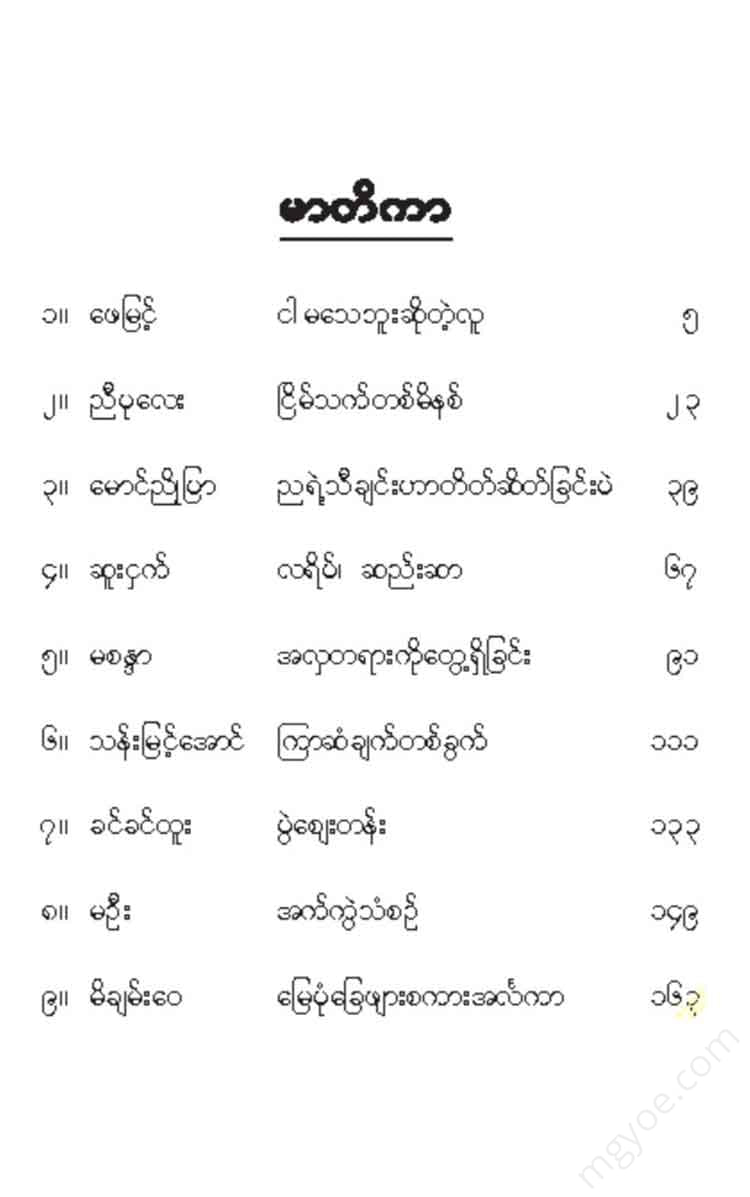Other Websites
Pe Myint - A Minute of Silence and Other Short Stories
Pe Myint - A Minute of Silence and Other Short Stories
Couldn't load pickup availability
Father Myint
I am not a father.
"I have only one life. If I die, it's all over. What should I do? I've thought a lot about what I'm going to do in the time I have."
I am not a father.
The doctor entered the office of his superior, holding a stack of papers. The patient followed behind him. The patient was seated in a chair in the room and the doctor handed the papers to him.
"Please provide a brief medical history and assessment that I can ask about the patient and the patient's family."
The doctor flipped through the papers. The medical history was quite long. He looked at the patient. The patient was sitting respectfully in the chair. There was a look of concern in the patient's eyes.
The doctor noticed that the shades of the face were mixed. But the lips were different. There was a hint of mockery on the lips. It seemed to say, "Okay, you can do your best, but you won't succeed."
The doctor was still observing, and suddenly the patient said something.
"I'm not dead, I'm not dead yet."
Suddenly, the doctor was surprised. He stared at her for a moment. But in his life, he had seen thousands of cases of mental illness. He turned away from the patient and began to read the medical history.
U Min Han, 55, was born in a small village near Hinthada Township. He lived in poverty as a child. He received his education at the village monastery. After that, he struggled to stand on his own two feet as a government high school student.
After completing the tenth grade, he moved to Yangon. While working as a clerk, he continued his education at Thetgyi University.
Then he entered the world of politics.
At the moment, his economic situation is at its best.
His illness or main symptom is "paranoia of death."
U Min Han was born into a Buddhist family and lived in the village monastery for over five years.
Therefore, it can be said that he was a born Buddhist who was greatly influenced by Buddhist ideas and Buddhist cultural traditions.
But even under such influence, U Min Han seems to have had little faith in religion. Or perhaps a greater influence came into play. He abandoned his original beliefs and became a Marxist.
However, later in his political career, U Min Han asserted that he no longer believed in Marxism.
After abandoning Marxism, he did not return to traditional ideology.
Therefore
U Min Han is not a Buddhist, not a Marxist, not a Ba'athist.
When discussing the issue of abandoning religion,
According to U Min Han, he said that he...
Close relatives said that U Min Han disliked the life of living in a monastery even when he was young, that he had a sense of inferiority complex about being a monk, and that he would often fight with the younger students who lived with him at the monastery.
He also often fought with children from the neighborhood who teased him about being a monk, suggesting that these factors may have been key factors in his later rejection of religion.
Regarding abandoning Marxism, U Min Han said that he was not reluctant to accept and believe in an idea if he thought it was right, but he was also reluctant to abandon it if he thought it was wrong.
He is a man who is slow to learn. Marxism has... His political views have been constantly changing in line with his real life experiences. He is a practical politician. He is not the kind of person who chases after impossible dreams. He thinks about what is possible in the moment. He thinks about it and does what seems possible. That is why some people say that politics is the art of doing what is possible. When I was young, I used to love and worship the word "impossible" and said that it was not in my dictionary. However, later, in terms of real life, the word "impossible" became a word that no dictionary could avoid.
He accepted that. Originally, he had hoped to become as great as Marx, Engels, Lenin, Stalin, Mao Zedong, and Castro. However, when he tried it and failed, his faith was shattered. His expectations gradually lowered. Therefore, when the situation gave him the opportunity, he left Marxism and the Marxist community. However, he continued to work in the political world because he was able to use the political organizational skills he had learned through experience and practice as a career. When it was no longer easy to continue in that position, he devoted himself to his own business. In fact, he realized that he would not be able to continue in the political field for long, so he started his own business early on, and now his business is quite well established.



